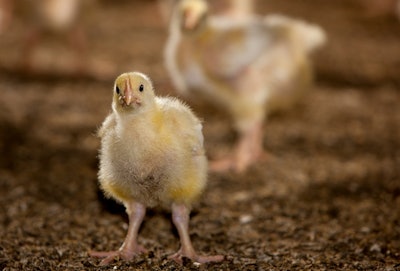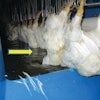
Highly pathogenic avian influenza (HPAI) vaccination won’t happen in the U.S. for years, but it may be a useful tool for fighting the aggressive disease in the future.
Global crisis
At the end of 2021, the global outbreak of the H5 strain of HPAI circulating in migratory wild bird populations returned to North America. This set off a cascade of animal health and economic effects primarily in the layer and turkey industries in the U.S., but it is really part of a larger, older Eurasian and now American outbreak of the disease.
In 2022, Europe experienced its worst ever HPAI season which accelerated talks in the European Union about vaccination. France is expected to begin vaccinating birds as soon as September 2023. Meanwhile, in South America, similar conversations are taking place and some countries are considering vaccination in response to the disease, too.
International trade
However, Dr. John Clifford, the USA Poultry & Egg Export Council’s (USAPEEC) veterinary trade advisor, said the main sticking point for the U.S. is international trade. The global standard for HPAI vaccination is countries do not accept imports from countries that vaccinate. The reasoning goes, if they are vaccinating, it indicates HPAI is endemic and therefore not under control.

So, if the U.S. were to begin vaccinating it could potential put what he valued as a $6 billion export market at risk, along with the livelihoods of those employed by the farming and processing of those animals.
It’s impossible to predict what will happen, but attitudes could be changing. Right now, vaccination is a non-starter in the broiler industry because the animals don’t live long enough plus the huge trade worries. Clifford said he thinks some countries the U.S. trades with would accept vaccination, but others would not.
One big assessment will come in May 2023, Clifford said, when the World Organization for Animal Health (WOAH) will issue a report on a survey it is conducting on international opinions toward HPAI vaccination. That survey, he said, will indicate which countries may or may not support the use of vaccine going forward.
Practical considerations
Today, the U.S. could not vaccinate because it doesn’t have an approved vaccine that’s a good match for the virulent H5 strain of the virus. But, vaccines exist elsewhere in the world and there are vaccination strategies that could work down the road.
Clifford said vaccination could be more than two years away, if ever. Broilers and breeders would not be interested in it, but layers and possibly some turkey operations would be. Current vaccine technology, he said, would require picking up and vaccinating individual birds at least twice in their life outside the hatchery, which would be an expensive proposition.
Current U.S. Department of Agriculture (USDA) policy, according to a position paper by the USAPEEC, is to use vaccine only as part of an emergency response plan in certain areas. In 2015, the agency stockpiled vaccine which it planned to use as a so-called ring vaccine to slow lateral spread of the disease if it returned.
Vaccine technologies
Dr. Carol Cardona, Pomeroy chair in avian health for the University of Minnesota College of Veterinary Medicine, said the current policy and current technical limitations make vaccination unappealing. Moreover, in this outbreak most of the introductions are coming from wild birds not from human, lateral disease spread.
Cardona said the Center for Veterinary Biologics (CVB), a body within the USDA’s Animal and Plant Health Inspection Service, is charged with approving vaccines for use in the country. The CVB rules prevent the use of vaccines that could spread outside of a barn, which includes some vaccine platforms.
 (Courtesy Big Dutchman)
(Courtesy Big Dutchman)
The CVB rule, she said, limits the ability of farmers in the U.S. to immunize large numbers of birds against HPAI at any one time.
Necessary steps
Cardona said there are vaccines available that would be effective against this current strain of HPAI but the USDA and CVB have not approved them.
In her opinion, she said, the CVB should explore using the Newcastle vaccine platform she mentioned in the U.S. There could be trials conducted in Mexico to evaluate the question of spread outside the barn, which to her knowledge, have not been done.
The next challenge will be broaching the issue with trading partners. The disease is obviously more global and more advanced – and presenting some chilling, if remote, human health risks – which will accelerate and potentially change the conversation about vaccination and its role in the global poultry industry.
Cardona said the biggest critics of vaccination will be countries that don’t have HPAI yet. Brazil is the only country exporting more poultry than the U.S.
“My guess is that once we see Brazil with HPAI, I think we are going to start to see that maybe break down a little bit,” Cardona said.
DIVA
David Swayne, a private veterinarian at Bird Flu Veterinarian LLC, said he recently attended an international conference discussing barriers to vaccine use to combat HPAI. He said most of the barriers are political or social. Those that he called the real barriers have solutions.

Local and international authorities need certainty vaccinated flocks aren’t getting exported. If they would accept vaccination, they need proven areas of containment.
A solution would lie in the DIVA, or differentiation between infected and vaccinated animals, vaccination strategy. This would separate vaccinated and non-infected birds from the vaccinated and infected birds to keep the infected birds out of international trade.
A key part of a trade agreement would be defining exactly how much surveillance should go along with vaccination. Swayne said the European Union already set guidelines for vaccine use and surveillance. France, also an exporter of poultry products, will allow targeted vaccination of a small number duck flocks this fall, he said.
Focused vaccination
Provided trade barriers did not exist and an approved vaccine was available in the U.S., Swayne said HPAI vaccination wouldn’t be national but rather focused on specific flocks in certain geographic areas.
Zoo birds, particularly those coming from endangered species, and raptors kept for falconry would be ideal candidates since they are excepted from the WOAH’s poultry classification.
A vaccination plan would be focused on an area of crisis. For example, Minnesota’s turkey industry was disproportionately affected by HPAI. Swayne said in the future a vaccine could be used in specific populations in one heavily affected state. The same would be true of layer operations. Areas of highest risk would be targeted for vaccination.
 (Altinosmanaj | BigStockPhoto.com)
(Altinosmanaj | BigStockPhoto.com)
Swayne, like Cardona, was skeptical of the argument vaccination will cause silent infections and inadvertently spread the disease to otherwise healthy birds. A good vaccine, he said, will prevent sickness and death and greatly reduce viral shedding.
Swayne said vaccination wouldn’t be national but rather focused on specific flocks in certain geographic areas.
Should the U.S. vaccinate?
Swayne said the U.S. and Europe are different than developing countries which vaccinate because they need to preserve their domestic poultry industry. The U.S. and Europe have the infrastructure for targeted vaccination, surveillance and disposal of infected flocks to maintain a larger, stamping out-driven HPAI strategy.
With the present trade barriers, Swayne said he does not support vaccination. If they were resolved, the turkey and layer industries could greatly benefit from vaccination in addition to stamping out. HPAI infected birds would be stamped out either way.
Dr. Richard Webby, director of the World Health Organization’s (WHO) Collaborating Centre for Studies on the Ecology of Influenza in Animals and Birds, said he thinks vaccination is an important piece of the control puzzle. This is especially important since he considers HPAI to be endemic in migratory birds at this point.
“It is not the golden bullet, but used in conjunction with other strategies including enhanced surveillance and increased biosecurity, it has the capacity to reduce the number of outbreaks, reduce the number of birds culled and reduce the contact between people and infected birds,” Webby said.
Clifford said he’s against vaccination because there’s far more downside than upside to using it. Given a vaccine that works, vaccines could be appealing for sectors of the turkey and layer industries, but those conditions don’t currently exist.
Cardona said she believes the science supports immunization but its not necessary at this time for all poultry commodities. She said stamping out may not be sustainable in the long term, and in the intertest of food security, the U.S. is obliged to investigate vaccination.
 If the U.S. were to begin vaccinating it could put its estimated $6 billion export market at risk.(Snizhana Galytska)
If the U.S. were to begin vaccinating it could put its estimated $6 billion export market at risk.(Snizhana Galytska)
“It feels like we are putting on a blindfold, and tying our hands behind our back and saying, ‘Okay, now let's fight this disease.’ And I just don't understand it.”
Risk of avian flu spread to European poultry set to rise again www.WATTAgNet.com/articles/46922




